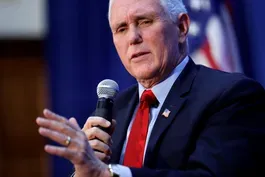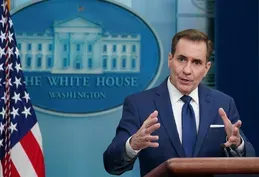
Brooks and Capehart on Biden getting his message out
Clip: 2/10/2023 | 10m 31sVideo has Closed Captions
Brooks and Capehart on Biden getting his message out, GOP primary poll
New York Times columnist David Brooks and Washington Post associate editor Jonathan Capehart join Amna Nawaz to discuss the week in politics, including President Biden taking his message on the road after the State of the Union address and a new poll has an early look at the Republican primary.
Problems with Closed Captions? Closed Captioning Feedback
Problems with Closed Captions? Closed Captioning Feedback
Major corporate funding for the PBS News Hour is provided by BDO, BNSF, Consumer Cellular, American Cruise Lines, and Raymond James. Funding for the PBS NewsHour Weekend is provided by...

Brooks and Capehart on Biden getting his message out
Clip: 2/10/2023 | 10m 31sVideo has Closed Captions
New York Times columnist David Brooks and Washington Post associate editor Jonathan Capehart join Amna Nawaz to discuss the week in politics, including President Biden taking his message on the road after the State of the Union address and a new poll has an early look at the Republican primary.
Problems with Closed Captions? Closed Captioning Feedback
How to Watch PBS News Hour
PBS News Hour is available to stream on pbs.org and the free PBS App, available on iPhone, Apple TV, Android TV, Android smartphones, Amazon Fire TV, Amazon Fire Tablet, Roku, Samsung Smart TV, and Vizio.
Providing Support for PBS.org
Learn Moreabout PBS online sponsorshipAMNA NAWAZ: After his State of the Union address, President Biden is taking his message on the road, making stops in battleground states and outlining his plans for the upcoming political season.
For analysis on this and more of the week's political news, it's time for Brooks and Capehart.
That is New York Times columnist David Brooks and Jonathan Capehart, associate editor for The Washington Post.
Good to see you both.
JONATHAN CAPEHART: Hey, Amna.
DAVID BROOKS: Good to see you.
AMNA NAWAZ: So, we spent some time together watching the State of the Union Tuesday.
We talked about this on the night as well, Jonathan.
The president focused a lot on the economy, and a lot of specifics, things like junk fees, credit card fees, right, bringing down the cost of prescription drugs.
He is now working in a divided Congress.
He made a lot of pledges that night.
How many of those pledges can he see through legislatively?
JONATHAN CAPEHART: That remains to be seen.
I mean, we know why.
Speaker McCarthy isn't -- and his caucus, they're not terribly interested in accomplishments that will make the president look good.
But what I think the president was doing by looking at all these seemingly narrow things was communicating to the American people, I see your pain.
I know what you're going through.
You're being nickeled and dimed, and I'm on it.
The other thing, though, by the president focusing so much on the economy, is, he knows he's got a record.
That last Congress was successful for him.
And a lot of the things that they passed will come to fruition, or at least, start this year and next year.
And so he's setting things up to say, hey, I'm going to be breaking a lot of ground, I'm going to be cutting a lot of ribbons, and I'm going to be in your faces for the next two years to remind you of all the things that we, meaning the Biden administration, have done for you.
That's what that -- I think that State of the Union was all about.
AMNA NAWAZ: He did essentially carry out a kind of-real time negotiation, which was unusual to see, right?
He drew out enough booze from Republicans when he referenced the handful of Republicans who have talked about entitlement reform.
And the White House seems to think he secured a pledge that no one's going to be touching Medicare or Social Security anytime soon, right?
It was unusual, but was it effective, David?
DAVID BROOKS: I think that moment was effective.
It made all the Democrats I know really happy.
So that's good.
(LAUGHTER) DAVID BROOKS: I like my Democratic friends to be happy.
Rick Scott is the senator from Florida who said we should sunset laws after five years, and that was seized on as, oh, they're going to cut your Medicare and Social Security.
Maybe, maybe not.
In any case, whatever Rick Scott was selling, Mitch McConnell was not buying.
So there was no shot that the Republicans were really going to be for -- against -- for cutting entitlement spending.
But it is a sign, that and a whole bunch of other issues, how much American politics has moved.
2012, you had a lot of Republicans saying, we need to reform entitlements because we can't afford it.
2012, you had a lot of Republicans and Democrats who were pretty pro-globalization, let's be partners with China.
And on every single one of these issues, if you looked at that Biden speech, it's clearly a post-Trump speech.
Trump has shifted the Overton window of American politics.
And so Biden, a Democrat, is speaking in a very different climate -- or manner than Trump does, is buy American, secure the border, we're taking on China, reshoring, no more offshoring.
And so it's a bunch of Trumpy issues done with a Biden -- much more substance, frankly.
But the whole focus of American politics has shifted toward the working class in the heartland.
And Trump really is somewhat responsible for that shift of attention.
AMNA NAWAZ: You're almost describing America first, but with a Biden lens.
Do you see it that way?
JONATHAN CAPEHART: Sure.
I see it, but with a heart and some empathy for the people who have been left behind.
I just want to pick up on one other thing about this real-time negotiation that happened before our eyes.
AMNA NAWAZ: Yes.
JONATHAN CAPEHART: Not bad for an 80-year-old man.
You have got a lot of people who are worried about him, and he's lost a step, and he's too old.
That was the biggest platform he will have as president this year to talk to the American people.
And, in real time, the American people saw him corral the Republicans into a corner and make them applaud something that they will soon regret.
AMNA NAWAZ: He did.
(CROSSTALK) AMNA NAWAZ: Yes, go ahead, David.
DAVID BROOKS: Yes, Amna, I do think he made Democrats feel happier about the fall campaign they're entering into.
AMNA NAWAZ: Yes.
DAVID BROOKS: And I think Republicans, I have heard since some, like, disquiet, especially about Sarah Huckabee Sanders' remarks.
And they have mentioned two things.
A historian of conservatism, Matt historian of conservatism, Matt Continetti, mentioned this to me, that the two things Republicans should be proud of is, one, Donald Trump, and she didn't mention his name, and the second is abortion, like the big policy victory for Republicans, not a word on abortion.
AMNA NAWAZ: Yes.
DAVID BROOKS: And so if you can't talk about your two major successes, you're a party with, like, some holes in your agenda.
(LAUGHTER) AMNA NAWAZ: Well, let's talk about that party moving forward, then, because we have some new poll numbers I know you have both seen.
Republican voters were asked about in a Monmouth poll about who they would support in the 2024 contest for president.
Two names topped the field by a lot, Florida Governor Ron DeSantis and former President Donald Trump.
About a third of all folks named them.
Everyone else, Mike Pence, Nikki Haley, Ted Cruz, Rand Paul, Mike Pompeo, kind of fell down in the 2 to 1 percent range.
We should also point out a quarter of people said they just didn't know.
The huge caveat here, this is February of 2023.
(LAUGHTER) AMNA NAWAZ: There are several political lifetimes to go.
But what do you take away from those numbers?
JONATHAN CAPEHART: Ron DeSantis is the -- is the shiny object.
He is the flavor of the month.
Donald Trump is the -- he is dominating the scene, as he has since he came down the escalator June 16, 2015.
Those numbers are going to fluctuate as more people actually get into the race and they get on this national stage, where it's a lot harder to run for president than it is to be speculated as someone who's going to run for president, and you roar to reelection as, say, Ron DeSantis did in Florida.
But once he gets on that national presidential stage, his whole world changes.
And I bet those poll numbers change as well.
AMNA NAWAZ: David, Nikki Haley is going to Iowa.
We expect her to announce her candidacy.
Tim Scott is going to Charleston, South Carolina, for a GOP dinner there as well.
DAVID BROOKS: Going to South Carolina.
AMNA NAWAZ: This field is going to get a lot more crowded?
DAVID BROOKS: I think it's -- it looks like it's going to get crowded.
Good for Nikki Haley for being the first one in.
I think -- first, I'm a little surprised.
If you go back historically, the polls even this far out are not meaningless.
They do tell you something.
But I do think Nikki Haley is vastly undervalued, that the two grumpy guys, we will call them, Trump and DeSantis, are going to wrestle each other to the ground.
And I think, at some point, there will be a lane for Republican sort of Trumpy, but not all that chaos, not -- with a different demeanor.
And Nikki Haley has a much more sunshiny demeanor.
So does Tim Scott has a much more normal demeanor, Glenn Youngkin, Governor Kemp in Georgia.
I have a feeling there's a lane for one of that kind of person.
And I would say the non-culture war Republican Party reasserted itself in 2022.
And they're -- I think a lot of those people are looking for a candidate.
And, right now, some may imagine DeSantis.
I think it probably is not to be DeSantis.
It will be one of those other people.
AMNA NAWAZ: It's interesting, though, because a crowded field last time benefited Mr. Trump.You don't think the same thing would happen this time?
DAVID BROOKS: Well, if you look at the crowded field last time, with -- well, all them, Rubio, Cruz -- I want to say - - the New Jersey governor, all of them.
JONATHAN CAPEHART: Oh, Chris Christie.
DAVID BROOKS: Chris Christie.
They had -- they were at 9 and 10's.
There were like not too many 2's.
There were a lot of 9 and 10's, people up there.
So they had real support.
So the field really was divided.
And, this time, it might be the two big guys we're talking about, and maybe one other.
And so -- and, in some sense, that's less divided.
And I think once it becomes Trump and somebody else, the pressure for everybody else to get out will be immense.
AMNA NAWAZ: Before I let you go, we like to point out bipartisanship whenever on this show.
And when it comes to China and this spy balloon, there was frustration from both Democrats and Republicans this week when they looked at how President Biden reacted, how the Department of Defense reacted, saying they should have acted more quickly.
I'm just curious to get both of your takes on how you think this has been talked about, especially in light of this new incident we have today.
We don't know the origin of this aircraft, but we know they acted very quickly to shoot down whatever it was over Alaska.
JONATHAN CAPEHART: Well, look, I don't know much about this latest flying object that was blown out of the sky, this time over Alaska.
But when it comes to the balloon, I understand the frustrations of the Democratic senators and the Republican senators, particularly from the states where the balloon sailed over.
But I also understand why the administration did what it did, by following the balloon, shooting it down over the over shallow waters, relatively shallow waters, off the South Carolina coast, and then collecting all the material.
We don't know if the Pentagon, while the balloon was drifting over the continental U.S., were we pulling out information.
Were we jamming signals?
What were -- what was the United States doing while that balloon was up there.
And I think we -- time will tell if we actually got really good intelligence and information, not just about the balloon, but about what China is up to.
AMNA NAWAZ: David, I will give you the last word here.
We got a minute-and-a-half left.
DAVID BROOKS: Yes.
First, on the new object, I think it's a toaster.
I'm here to report, it's a toaster.
(LAUGHTER) DAVID BROOKS: There are two ways to see this.
I think both the Chinese and the Americans are realizing how fraught relationship has become.
And so I thought both sides, the Biden administration, their comments in the State of the Union said, we're not taking this to the mat.
We're trying to tone down the pressure.
And, for their part, the Chinese sort of used state media and not to let their nationalists whip this up.
So both sides said, ah, let's pull this back a little.
And relations are not what they were in 2001, when we had two planes crash, and then you could -- it was really a much warmer relationship, so you could manage a crisis.
But I think we learned this week that, even in the fraught relationship that now exists between the two countries, there's still an instinct, let's not get carried away here.
And I think we can take some salve, some peace from that.
AMNA NAWAZ: You're not worried that this could increase tensions between... (CROSSTALK) DAVID BROOKS: Oh, it totally could.
I mean, the long trajectory is a total increase of tensions.
But it didn't happen this week.
(LAUGHTER) AMNA NAWAZ: Didn't happen this week.
And, for that, we are grateful.
David Brooks, Jonathan Capehart, always good to see you both.
Thank you.
JONATHAN CAPEHART: Thanks, Amna.
Cracking down on sex trafficking in AZ ahead of Super Bowl
Video has Closed Captions
Clip: 2/10/2023 | 5m 24s | The efforts to crack down on sex trafficking in Arizona ahead of Super Bowl (5m 24s)
House Republicans take steps to block new D.C. criminal code
Video has Closed Captions
Clip: 2/10/2023 | 7m 40s | House Republicans take steps to block new criminal code in Washington, D.C. (7m 40s)
Newspapers collaborate to finish work of murdered reporter
Video has Closed Captions
Clip: 2/10/2023 | 8m 3s | Two newspapers collaborate to finish work of murdered investigative reporter (8m 3s)
Pence subpoenaed by special counsel investigating Trump
Video has Closed Captions
Clip: 2/10/2023 | 4m 50s | Pence subpoenaed by special counsel investigating Trump's efforts to overturn election (4m 50s)
Turkey, Syria earthquake death toll nears 24,000
Video has Closed Captions
Clip: 2/10/2023 | 6m 43s | Aid reaches remote regions in Turkey and Syria as earthquake death toll nears 24,000 (6m 43s)
U.S. shoots down object that flew into airspace near Alaska
Video has Closed Captions
Clip: 2/10/2023 | 3m 5s | U.S. shoots down object that crossed into airspace near Alaska (3m 5s)
Providing Support for PBS.org
Learn Moreabout PBS online sponsorshipSupport for PBS provided by:
Major corporate funding for the PBS News Hour is provided by BDO, BNSF, Consumer Cellular, American Cruise Lines, and Raymond James. Funding for the PBS NewsHour Weekend is provided by...
















